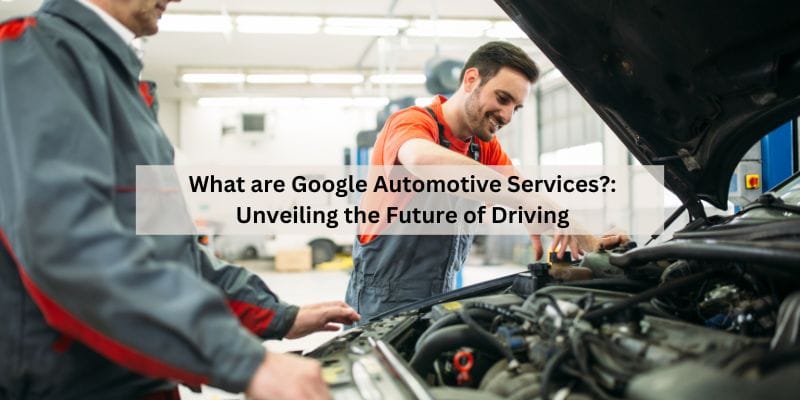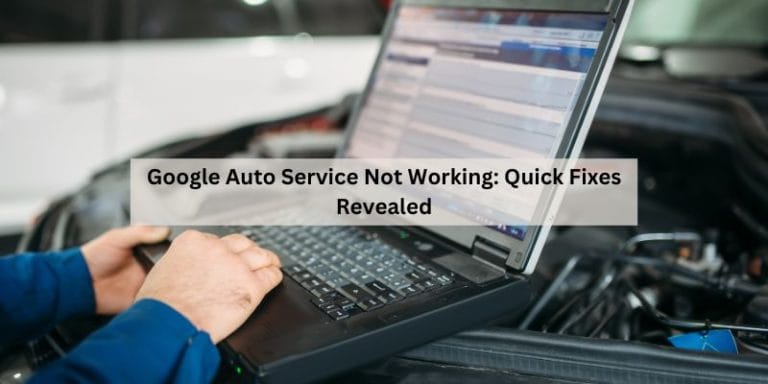What are Google Automotive Services?: Unveiling the Future of Driving
Google Automotive Services (GAS) is a collection of applications and services that automotive OEMs can choose to license and integrate into their in-vehicle infotainment (IVI) systems. GAS allows car makers to provide Google services such as Maps, Play Store, Assistant, and more, by working directly with Google to support GAS.
With GAS, vehicles can receive automatic updates directly from Google, delivering new apps, features, and a more connected experience. This system is part of Android Automotive OS, an operating system installed on the vehicle itself, enabling software-defined vehicles. GAS is being used by car manufacturers like Volvo, Renault, Ford, and GM to enhance their in-car technology and provide a seamless user experience.
Introduction To Google Automotive Services
Google Automotive Services (GAS) represent a suite of applications and services for automotive OEMs to license and integrate into their in-vehicle infotainment systems. This collection goes beyond traditional navigation and entertainment features, offering a comprehensive set of tools and functionalities. GAS is designed to provide a seamless and integrated experience for both drivers and passengers. It enables access to essential Google services such as Maps, Play Store, and Assistant directly within the vehicle. GAS is built on top of the Android Automotive OS, serving as a key enabler for software-defined vehicles. The technology is already being utilized by major automotive companies including Volvo, Renault, Ford, and GM, under the “Cars with Google built-in” branding. The evolving landscape of in-car technology is driving the adoption of Google Automotive Services, revolutionizing the driving experience.
Key Components Of Gas
Google Automotive Services (GAS) is a collection of applications and services that automotive OEMs can choose to license and integrate into their in-vehicle infotainment (IVI) systems. GAS consists of software built on top of Android Automotive OS for the purpose of delivering essential services, including Google Maps for seamless navigation, Google Play for entertainment on the go, and Google Assistant as your driving companion. GAS enables car makers to provide Google services such as Maps, Play Store, Assistant, and more directly to users. Notably, Volvo, Renault, Ford, and GM are among the companies using Android Automotive OS with GAS integrated into their vehicles, offering a seamless and connected driving experience.
Android Auto Vs. Android Automotive: A Clear Distinction
Google Automotive Services (GAS) is a collection of applications and services that automotive OEMs can choose to license and integrate into their in-vehicle infotainment (IVI) systems. Android Auto connects smartphones with the infotainment system via an app, while Android Automotive OS is the operating system installed on the vehicle itself, enabling software-defined vehicles. GAS, advertised as “Cars with Google built-in” by Google, includes software built on top of Android Automotive OS for delivering services such as Maps, Play Store, and Assistant. Volvo, Renault, Ford, and GM are among the companies using Android Automotive OS with GAS.
The Significance Of Gas For Automakers
Google Automotive Services (GAS) offer a crucial collection of applications and services for automakers to integrate into their in-vehicle infotainment systems. GAS enables seamless access to Google services like Maps, Play Store, and Assistant, providing an enhanced driving experience for users.
Leading automakers such as Volvo, Renault, Ford, and GM are leveraging GAS to deliver innovative features to their customers.
| What are Google Automotive Services? |
|---|
| Google Automotive Services (GAS) is a collection of applications and services that automotive OEMs can choose to license and integrate into their in-vehicle infotainment (IVI) systems. GAS consists of software built on top of Android Automotive OS, which is an operating system that’s installed on the vehicle itself, acting as the key enabler for software-defined vehicles. GAS is advertised as “Cars with Google built-in” by Google and is being adopted by leading car manufacturers such as Volvo, Renault, Ford, and GM. GAS allows automakers to customize the in-car experience by providing access to Google services such as Maps, Play Store, Assistant, and more. For details and access to the latest version of GAS applications, reach out to your Google point of contact. |
How Gas Is Shaping The Future Of Driving
Google Automotive Services (GAS) is a suite of applications and services that automotive OEMs can integrate into their in-vehicle infotainment systems. It enables car makers to offer Google services such as Maps, Play Store, and Assistant directly to users, shaping the future of driving with seamless connectivity and functionality.
| What are Google Automotive Services? |
| Google Automotive Services (GAS) is a collection of applications and services that automotive Original Equipment Manufacturers (OEMs) can license and integrate into their in-vehicle infotainment systems. GAS consists of software built on top of Android Automotive OS for the purpose of delivering services such as Google Maps, Play Store, Assistant, and more. |
| How GAS is Shaping the Future of Driving |
| Enhanced Safety Features |
| GAS is working to enhance the safety features of driving by providing real-time traffic updates and route optimization. The built-in Google Maps helps drivers to navigate with ease, and the voice-activated Assistant allows drivers to focus on the road while accessing information and controlling vehicle features. |
| Personalization and User Experience |
| GAS offers a personalized user experience by providing customized recommendations based on the user’s preferences and driving history. GAS allows drivers to access their favorite music, media, and messaging apps in the car, making the driving experience more enjoyable and convenient. |
Challenges And Considerations
Google Automotive Services (GAS) is a comprehensive collection of applications and services that automotive manufacturers can choose to integrate into their in-vehicle infotainment systems. GAS allows carmakers to provide Google services like Maps, Play Store, and Assistant, enhancing the overall user experience.
It is an operating system installed directly on the vehicle, enabling software-defined vehicles and seamless connectivity.
| Challenges and Considerations |
| Data Privacy and Security Concerns |
| With the integration of Google Automotive Services (GAS) in vehicles, data privacy and security concerns have become a major challenge for automotive OEMs. GAS collects a vast amount of data from the vehicle, including driving behavior, location, and personal information. Automotive OEMs must ensure that this data is protected against cyber threats and unauthorized access. They must also comply with data privacy laws and regulations in different regions where the vehicles are sold. |
| Compatibility and Integration Issues |
| Another challenge with GAS is compatibility and integration issues. Automotive OEMs must ensure that the GAS applications and services are compatible with their in-vehicle infotainment (IVI) systems. They must also integrate GAS seamlessly with their existing systems and applications. This requires a high level of technical expertise and collaboration between the automotive OEMs and Google. |
The Road Ahead For Gas
Google Automotive Services (GAS) is a collection of applications and services that automotive OEMs can integrate into their in-vehicle infotainment systems. It allows car makers to provide Google services such as Maps, Play Store, and Assistant directly to their customers.
GAS is built on top of Android Automotive OS and offers essential smartphone features for a seamless driving experience.
| Google Automotive Services | Android Auto | Android Automotive |
|---|---|---|
| A suite of applications and services that automotive OEMs can choose to license and integrate into their IVI systems | An app installed on the infotainment system that connects smartphones with the system | An operating system installed on the vehicle itself that enables software-defined vehicles |
| Includes software built on top of Android Automotive OS | N/A | Uses Android Automotive OS as the key enabler |
| Allows for the delivery of Google services such as Maps, Play Store, and Assistant | Connects to smartphone apps for music, media, and messaging | Enables the delivery of Google services through the operating system |
Conclusion: The Drive Towards A Connected Future
Google Automotive Services (GAS) is a collection of applications and services that automotive OEMs can license and integrate into their in-vehicle infotainment systems. GAS offers essential smartphone features directly in the vehicle, providing access to apps, maps, media, and messaging apps. The system, known as Android Automotive OS, serves as the key enabler for software-defined vehicles. Automotive giants such as Volvo, Renault, Ford, and GM have integrated GAS into their vehicles, offering a connected driving experience. GAS enables direct collaboration with Google to support services such as Maps, Play Store, and Assistant, enhancing the in-car experience for drivers and passengers.
Frequently Asked Questions
Who Uses Google Automotive Services?
Volvo, Renault, Ford, and GM are some of the companies using Google Automotive Services (GAS). GAS is a collection of applications and services that automotive OEMs can integrate into their in-vehicle infotainment systems. It provides features like Maps, Play Store, and Assistant.
GAS is built on top of the Android Automotive OS.
What Is The Difference Between Google Auto And Google Automotive?
Google Auto and Google Automotive refer to different aspects of Google’s involvement in the automotive industry. Google Auto typically refers to Android Auto, which is a smartphone app that connects to a vehicle’s infotainment system. On the other hand, Google Automotive generally refers to Google Automotive Services (GAS), a collection of applications and services that automakers can license and integrate into their in-vehicle infotainment systems.
While Android Auto is focused on smartphone integration, Google Automotive Services provides a broader range of features and services directly integrated into the vehicle itself.
What Is Gas In Google Automotive Services?
Google Automotive Services (GAS) is a collection of applications and services that automotive OEMs can license and integrate into their in-vehicle infotainment systems. It allows car manufacturers to provide Google services such as Maps, Play Store, Assistant, and more directly to their customers.
What Does Google Auto Do?
Google Auto is an application that allows easy access to music, media, and messaging apps in your car. It is different from Google Automotive, which is an operating system installed directly on the vehicle itself. Google Automotive Services (GAS) is a collection of applications and services that can be integrated into in-vehicle infotainment systems by automotive OEMs.
Conclusion
Google Automotive Services (GAS) is a collection of applications and services that automotive OEMs can integrate into their in-vehicle infotainment systems. It offers features like Maps, Play Store, Assistant, and more, providing a seamless and connected experience for users. With GAS, car manufacturers like Volvo, Renault, Ford, and GM can enhance their vehicles with Google’s technology.
Android Automotive OS acts as the key enabler for software-defined vehicles, while Android Auto connects smartphones to the infotainment system. GAS is revolutionizing the automotive industry by bringing innovative solutions directly into vehicles.







